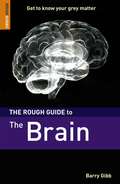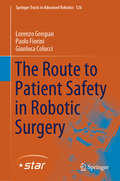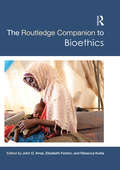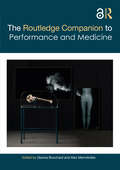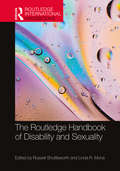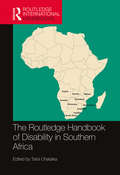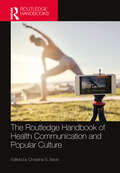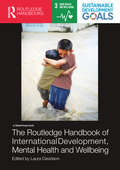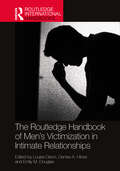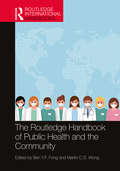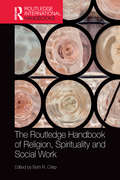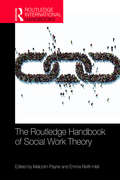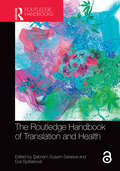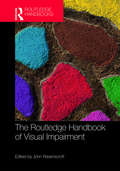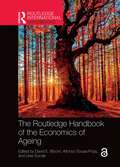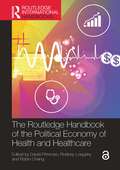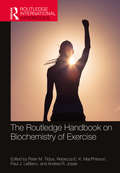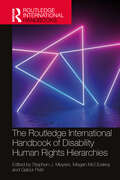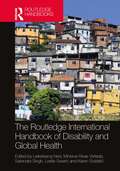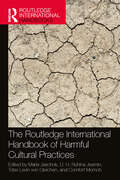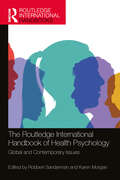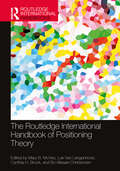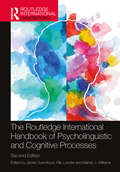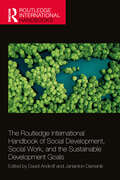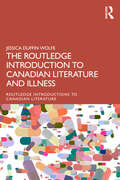- Table View
- List View
The Rough Guide to the Brain
by Barry J. GibbFor those who want to get to know their grey matter better, Gibb (molecular biologist/science communicator, UK) offers an up-to-date, accessible tour of the organ that is the key to consciousness. With visual aids, he explains the brain's continuing evolution (toward a human-machine hybrid?); processing under normal, abnormal, and supernormal conditions; and misconceptions and advances in understanding how it works. The book fascinating boxed material, intelligence tests, and resources. Annotation ©2008 Book News, Inc., Portland, OR (booknews.com)
The Route to Patient Safety in Robotic Surgery (Springer Proceedings in Advanced Robotics #126)
by Lorenzo Grespan Paolo Fiorini Gianluca ColucciThe introduction of a new technology in a consolidated field has the potential to disrupt usual practices and create a fertile ground for errors. An example is robotic surgery that is now used in most surgical specialties, pushed by technology developers and enthusiastic surgeons. To analyze the potential impact of robotic surgery on patient safety, a consortium of major European Universities started the project SAFROS whose findings are summarized and further elaborated in the three parts of this book. Part one describes safety in complex systems such as surgery, how this may disrupt the traditional surgical workflow, how safety can be monitored, and the research questions that must be posed. Part two of the book describes the main findings of this research, by identifying the risks of robotic surgery and by describing where its ancillary technologies may fail. This part addresses features and evaluation of anatomic imaging and modeling, actions in the operating room, robot monitoring and control, operator interface, and surgical training. Part three of the book draws the conclusions and offers suggestions on how to limit the risks of medical errors. One possible approach is to use automation to monitor and execute parts of an intervention, thus suggesting that robotics and artificial intelligence will be major elements of the operating room of the future.
The Routledge Companion to Bioethics (Routledge Philosophy Companions)
by John D. Arras Elizabeth Fenton Rebecca KuklaThe Routledge Companion to Bioethics is a comprehensive reference guide to a wide range of contemporary concerns in bioethics. The volume orients the reader in a changing landscape shaped by globalization, health disparities, and rapidly advancing technologies. Bioethics has begun a turn toward a systematic concern with social justice, population health, and public policy. While also covering more traditional topics, this volume fully captures this recent shift and foreshadows the resulting developments in bioethics. It highlights emerging issues such as climate change, transgender, and medical tourism, and re-examines enduring topics, such as autonomy, end-of-life care, and resource allocation.
The Routledge Companion to Performance and Medicine (Routledge Companions)
by Alex Mermikides Gianna BouchardThe Routledge Companion to Performance and Medicine addresses the proliferation of practices that bridge performance and medicine in the contemporary moment.The scope of this book's broad range of chapters includes medicine and illness as the subject of drama and plays; the performativity of illness and the medical encounter; the roles and choreographies of the clinic; the use of theatrical techniques, such as simulation and role-play, in medical training; and modes of performance engaged in public health campaigns, health education projects and health-related activism. The book encompasses some of these diverse practices and discourses that emerge at the interface between medicine and performance, with a particular emphasis on practices of performance.This collection is a vital reference resource for scholars of contemporary performance; medical humanities; and the variety of interdisciplinary fields and debates around performance, medicine, health and their overlapping collaborations.Chapter 18 of this book is freely available as a downloadable Open Access PDF at http://www.taylorfrancis.com under a Creative Commons Attribution CC-BY 4.0 license.
The Routledge Handbook of Disability and Sexuality (Routledge International Handbooks)
by Russell Shuttleworth and Linda R. MonaThis handbook provides a much-needed holistic overview of disability and sexuality research and scholarship. With authors from a wide range of disciplines and representing a diversity of nationalities, it provides a multi-perspectival view that fully captures the diversity of issues and outlooks. Organised into six parts, the contributors explore long-standing issues such as the psychological, interpersonal, social, political and cultural barriers to sexual access that disabled people face and their struggle for sexual rights and participation. The volume also engages issues that have been on the periphery of the discourse, such as sexual accommodations and support aimed at facilitating disabled people's sexual well-being; the socio-sexual tensions confronting disabled people with intersecting stigmatised identities such as LGBTBI or asexual; and the sexual concerns of disabled people in the Global South. It interrogates disability and sexuality from diverse perspectives, from more traditional psychological and sociological models, to various subversive and post-theoretical perspectives and queer theory. This handbook examines the cutting-edge, and sometimes ethically contentious, concerns that have been repressed in the field. With current, international and comprehensive content, this book is essential reading for students, academics and researchers in the areas of disability, gender and sexuality, as well as applied disciplines such as healthcare practitioners, counsellors, psychology trainees and social workers.
The Routledge Handbook of Disability in Southern Africa
by Tsitsi ChataikaThis comprehensive ground-breaking southern African-centred collection spans the breadth of disability research and practice. Reputable and emerging scholars, together with disability advocates adopt a critical and interdisciplinary stance to prove, challenge and shift commonly held social understanding of disability in traditional discourses, frontiers and practices in prominent areas such as inter/national development, disability studies, education, culture, health, religion, gender, sports, tourism, ICT, theatre, media , housing and legislation. This handbook provides a body of interdisciplinary analyses suitable for the development of disability studies in southern Africa. Through drawing upon and introducing resources from several disciplines, theoretical perspectives and personal narratives from disability activists, it reflects on disability and sustainable development in southern Africa. It also addresses a clear need to bring together interdisciplinary perspectives and narratives on disability and sustainable development in ways that do not undermine disability politics advanced by disabled people across the world. The handbook further acknowledges and builds upon the huge body of literature that understands the social, cultural, educational, psychological, economic, historical and political facets of the exclusion of disabled people. The handbook covers the following broad themes: • Disability inclusion, ICT and sustainable development • Access to education, from early childhood development up to higher education • Disability, employment, entrepreneurship and community-based rehabilitation • Religion, gender and parenthood • Tourism, sports and accessibility • Compelling narratives from disability activists on societal attitudes toward disability, media advocacy, accessible housing and social exclusion. Thus, this much-awaited handbook provides students, academics, practitioners, development partners, policy makers and activists with an authoritative framework for critical thinking and debates that inform policy and practice in incomparable ways, with the view to promoting inclusive and sustainable development.
The Routledge Handbook of Health Communication and Popular Culture (Routledge Handbooks in Communication Studies)
by Christina S. BeckThe Routledge Handbook of Health Communication and Popular Culture offers rich insights into the ways in which communication about health through popular culture can become a part of healing, wellness, and health-related decisions.This Handbook allows readers to understand and consider messages that inform and influence health-related choices through pop culture in the public sphere. Written in an accessible narrative style and including interdisciplinary, global, and diverse perspectives, a vast team of contributing authors from the field explores the intersections between health communication and popular culture. The Handbook is divided into five parts: Framing of Health-Related Issues in Popular Culture; Exploring Popular Culture Influences on Health Behaviors and Beliefs; Considering Pro-Social Public Health Interventions in Popular Culture; Understanding Health Issues in Popular Culture from Diverse Perspectives; and Pop Culture and Health Communication: Looks to the Future.The Handbook will be of interest to students and scholars in the fields of Communication Studies, Health Communication, Public Health Policy, Media Literacy, and Cultural Studies.
The Routledge Handbook of International Development, Mental Health and Wellbeing
by Laura DavidsonMental health has always been a low priority worldwide. Yet more than 650 million people are estimated to meet diagnostic criteria for common mental disorders such as depression and anxiety, with almost three-quarters of that burden in low- and middle-income countries. Nowhere in the world does mental health enjoy parity with physical health. Notwithstanding astonishing medical advancements in treatments for physical illnesses, mental disorder continues to have a startlingly high mortality rate. However, despite its widespread neglect, there is now an emerging international imperative to improve global mental health and wellbeing. The UN’s current international development agenda finalised at the end of 2015 contains 17 Sustainable Development Goals (SDGs), including SDG3, which seeks to ensure healthy lives and promote wellbeing for all at all ages. Although much broader in focus than the previous eight Millennium Development Goals (MDGs), the need for worldwide improvement in mental health has finally been recognised. This Handbook addresses the new UN agenda in the context of mental health and sustainable development, examining its implications for national and international policy-makers, decision-makers, researchers and funding agencies. Conceptual, evidence-based and practical discussions crossing a range of disciplines are presented from the world’s leading mental health experts. Together, they explore why a commitment to investing in mental health for the fulfilment of SDG3 ought to be an absolute global priority.
The Routledge Handbook of Men’s Victimisation in Intimate Relationships (Routledge International Handbooks)
by Louise Dixon, Denise A. Hines, and Emily M. DouglasThis handbook provides a timely synthesis of the international literature that investigates men’s experiences of intimate partner violence and help seeking behavior, and considers what the findings mean for research, practice, and policy.Providing the reader with a synthesis of cutting-edge knowledge, this book draws together a wealth of information from leading international researchers and practitioners working in the field of men’s victimization in intimate relationships. By including chapters that address a diverse range of men’s experiences and needs, it offers an accessible format for the reader to learn about the experiences of underrepresented groups of men across the world and how this knowledge can shape practice, policy, and future research.The Routledge Handbook of Men’s Victimisation in Intimate Relationships will be of great use to postgraduate students (including training psychologists, psychiatrists, medics, barristers/attorneys, social workers, probation officers, doctors, and nurses); academics, researchers, and professionals working in areas of family violence law, practice, policy and service provision.
The Routledge Handbook of Public Health and the Community (Routledge International Handbooks)
by Ben Y.F. FongCommunity health is an emerging and growing discipline of public health and it focuses on the physical, social, and mental well-being of the people of specific districts. This interdisciplinary field brings together aspects of health care, economics, environment, and people interaction. This handbook is a comprehensive reference on public health for higher education students, scholars, practitioners, and policymakers of health care. There are five key thematic sections in the book: perspectives in public health; community health in practise; planning, built, and social environment and community health; digital and mobile health; and, towards sustainable health in the community. Each theme explores the leading research and trends. This book aims to help achieve the shared goal of healthier communities and quality of life for the residents. This collaborative work should be a very useful handbook to health professionals and government bodies in the planning of initiatives to improve population health, prevent chronic diseases, control infectious diseases and outbreaks, and prepare for natural disasters. This handbook integrates research and practise of public health in the community.
The Routledge Handbook of Religion, Spirituality and Social Work (Routledge International Handbooks)
by Beth R. CrispThis international volume provides a comprehensive account of contemporary research, new perspectives and cutting-edge issues surrounding religion and spirituality in social work. The introduction introduces key themes and conceptual issues such as understandings of religion and spirituality as well as definitions of social work, which can vary between countries. The main body of the book is divided up into sections on regional perspectives; religious and spiritual traditions; faith-based service provision; religion and spirituality across the lifespan; and social work practice. The final chapter identifies key challenges and opportunities for developing both social work scholarship and practice in this area. Including a wide range of international perspectives from Australia, Canada, Hong Kong, India, Ireland, Israel, Malta, New Zealand, South Africa, Sweden, the UK and the USA, this Handbook succeeds in extending the dominant paradigms and comprises a mix of authors including major names, significant contributors and emerging scholars in the field, as well as leading contributors in other fields of social work who have an interest in religion and spirituality. The Routledge Handbook of Religion, Spirituality and Social Work is an authoritative and comprehensive reference for academics and researchers as well as for organisations and practitioners committed to exploring why, and how, religion and spirituality should be integral to social work practice.
The Routledge Handbook of Social Work Theory (Routledge International Handbooks)
by Malcolm Payne Emma Reith-HallThe Routledge Handbook of Social Work Theory provides an interdisciplinary and international introduction to social work theory. It presents an analytical review of the wide array of theoretical ideas that influence social work on a global scale. It sets the agenda for future trends within social work theory. Separated into four parts, this handbook examines important themes within the discourses on social work theory, as well as offering a critical evaluation of how theoretical ideas influence social work as a profession and in practice. It includes a diverse range of interdisciplinary topics, covering the aims and nature of social work, social work values and ethics, social work practice theories and the use of theory in different fields of practice. The contributors show how and why theory is so important to social work and analyze the impact these concepts have made on social intervention. Bringing together an international team of leading academics within the social work field and newer contributors close to practice, this handbook is essential reading for all those studying social work, as well as practitioners, policymakers and those involved in the associated fields of health and social care.
The Routledge Handbook of Translation and Health (Routledge Handbooks in Translation and Interpreting Studies)
by Şebnem Susam-SaraevaThe Routledge Handbook of Translation and Health provides a bridge between translation studies and the burgeoning field of health humanities, which seeks novel ways of understanding health and illness. As discourses around health and illness are dependent on languages for their transmission, impact, spread, acceptance and rejection in local settings, translation studies offers a wealth of data, theoretical approaches and methods for studying health and illness globally. Translation and health intersect in a multitude of settings, historical moments, genres, media and users. This volume brings together topics ranging from interpreting in healthcare settings to translation within medical sciences, from historical and contemporary travels of medicine through translation to areas such as global epidemics, disaster situations, interpreting for children, mental health, women’s health, disability, maternal health, queer feminisms and sexual health, and nutrition. Contributors come from a wide range of disciplines, not only from various branches of translation and interpreting studies, but also from disciplines such as psychotherapy, informatics, health communication, interdisciplinary health science and classical Islamic studies. Divided into four sections and each contribution written by leading international authorities, this timely Handbook is an indispensable resource for all students and researchers of translation and health within translation and interpreting studies, as well as medical and health humanities. Intorduction and Chapter 18 of this book are freely available as a downloadable Open Access PDF at http://www.taylorfrancis.com under a Creative Commons [Attribution-Non Commercial-No Derivatives (CC-BY-NC-ND)] 4.0 license.
The Routledge Handbook of Visual Impairment: Social and Cultural Research (Routledge International Handbooks)
by John RavenscroftThe Routledge Handbook of Visual Impairment examines current debates as well as cross-examining traditionally held beliefs around visual impairment. It provides a bridge between medical practice and social and cultural research drawing on authentic investigations. It is the intention of this Handbook to provide an opportunity to engage with academic researchers who wish to ensure a coherent and rigorous approach to research construction and reflection on visual impairment that is in collaboration with, but sometimes is beyond, the medical realm. This Handbook is divided into ten thematic areas in order to represent the wide range of debates and concepts within visual impairment. The ten themes include: cerebral visual impairment; education; sport and physical exercise; assistive technology; understanding the cultural aesthetics; socio-emotional and sexual aspects of visual impairment; orientation, mobility, habitation, and rehabilitation; recent advances in "eye" research and sensory substitution devices; ageing and adulthood. The 27 chapters that explore the social and cultural aspects of visual impairment can be taken and used in a variety of different ways in order to promote research and generate debate among practitioners and scholars who wish to use this resource to inform their practice in supporting and developing positive outcomes for all.
The Routledge Handbook of the Economics of Ageing (Routledge International Handbooks)
by David E. Bloom Alfonso Sousa-Poza Uwe SundeAgeing populations pose some of the foremost global challenges of this century. Drawing on an international pool of scholars, this cutting-edge Handbook surveys the micro, macro and institutional aspects of the economics of ageing. Structured in seven parts, the volume addresses a broad range of themes, including health economics, labour economics, pensions and social security, generational accounting, wealth inequality and regional perspectives. Each chapter combines a succinct overview of the state of current research with a sketch of a promising future research agenda. This Handbook will be an essential resource for advanced students, researchers and policymakers looking at the economics of ageing across the disciplines of economics, demography, public policy, public health and beyond.
The Routledge Handbook of the Political Economy of Health and Healthcare (Routledge International Handbooks)
by David Primrose Rodney Loeppky Robin ChangThis handbook provides a comprehensive and critical overview of the gamut of contemporary issues around health and healthcare from a political economy perspective. Its contributions present a unique challenge to prevailing economic accounts of health and healthcare, which narrowly focus on individual behaviour and market processes. Instead, the capacity of the human body to reach its full potential and the ability of society to prevent disease and cure illness are demonstrated to be shaped by a broader array of political economic processes. The material conditions in which societies produce, distribute, exchange, consume, and reproduce – and the operation of power relations therein – influence all elements of human health: from food consumption and workplace safety, to inequality, healthcare and housing, and even the biophysical conditions in which humans live.This volume explores these concerns across five sections. First, it introduces and critically engages with a variety of established and cutting-edge theoretical perspectives in political economy to conceptualise health and healthcare – from neoclassical and behavioural economics, to Marxist and feminist approaches. The next two sections extend these insights to evaluate the neoliberalisation of health and healthcare over the past 40 years, highlighting their individualisation and commodification by the capitalist state and powerful corporations. The fourth section examines the diverse manifestation of these dynamics across a range of geographical contexts. The volume concludes with a section devoted to outlining more progressive health and healthcare arrangements, which transcend the limitations of both neoliberalism and capitalism.This volume will be an indispensable reference work for students and scholars of political economy, health policy and politics, health economics, health geography, the sociology of health, and other health-related disciplines.Chapters 1 & 8 of this book is freely available as a downloadable Open Access PDF at http://www.taylorfrancis.com under a Creative Commons [CC BY NC ND] 4.0 license.
The Routledge Handbook on Biochemistry of Exercise (Routledge International Handbooks)
by Peter M. Tiidus Rebecca E. K. MacPherson Paul J. LeBlanc Andrea R. JosseFrom its early beginnings in the 1960s, the academic field of biochemistry of exercise has expanded beyond examining and describing metabolic responses to exercise and adaptations to training to include a wide understanding of molecular biology, cell signalling, interorgan communication, stem cell physiology, and a host of other cellular and biochemical mechanisms regulating acute responses and chronic adaptations related to exercise performance, human health/disease, nutrition, and cellular functioning. The Routledge Handbook on Biochemistry of Exercise is the first book to pull together the full depth and breadth of this subject and to update a rapidly expanding field of study with current issues and controversies and a look forward to future research directions. Bringing together many experts and leading scientists, the book emphasizes the current understanding of the underlying metabolic, cellular, genetic, and cell signalling mechanisms associated with physical activity, exercise, training, and athletic performance as they relate to, interact with, and regulate cellular and muscular adaptations and consequent effects on human health/disease, nutrition and weight control, and human performance. With more emphasis than ever on the need to be physically active and the role that being active plays in our overall health from a whole-body level down to the cell, this book makes an important contribution for scholars, medical practitioners, nutritionists, and coaches/trainers working in research and with a wide range of clients. This text is important reading for all students, scholars, and others with an interest in health, nutrition, and exercise/training in general.
The Routledge International Handbook of Disability Human Rights Hierarchies (Routledge International Handbooks)
by Stephen J. Meyers Megan McCloskey Gabor PetriDisability is defined by hierarchy. Regardless of culture or context, persons with disabilities are almost always pushed to the bottom of the social hierarchy. With the advent of the Convention on the Rights of Persons with Disabilities (2006), disability human rights seemingly provided a path forward for tearing down ableist social hierarchies and ensuring that all persons with disabilities everywhere were treated equally. Despite important progress, the disability human rights project not only remains incomplete, but has often created new hierarchies among persons with disabilities themselves or across the human rights it promotes. Certain groups of persons with disabilities have gained new voices while others remain silenced and certain rights are prioritized over others depending on what states, international organizations, or advocates want rather than what those on the ground need most. This volume was inspired both by the continued need to expose human rights violations against persons with disabilities, but to also explore the nuanced role that hierarchies play in the spread, implementation, and protection of disability human rights. The enjoyment of human rights is not equal nor is the recognition of specific individuals and groups’ rights. In order to change this situation, inequalities across the disability human rights movement must be explored. Divided into five parts: Who counts as disabled? Political, social, and cultural context Which rights on top, whose rights on bottom? Pushed to the periphery in the disability rights movement Representations of disability and comprised of 34 newly-written chapters including case-studies from the Anglophone Caribbean, Bangladesh, Bosnia-Herzegovina, China, Ghana, Haiti, Hungary, India, Israel, Kenya, Latin America, Poland, Russia, Scotland, Serbia and South Africa, and other countries, this book will be of interest to all scholars and students of disability studies, sociology, human rights law and social policy.
The Routledge International Handbook of Disability and Global Health (Routledge International Handbooks)
by Leslie Swartz Karen Soldatić Lieketseng Ned Minerva Rivas Velarde Satendra SinghThis handbook will raise awareness about the importance of health and well-being of people with disabilities in the context of the global development agenda: Leaving No-one Behind.There has been a growing discussion on how people with disabilities should be included in the global health landscape. An estimated one billion people have some form of disability, 80% of whom live in low- and middle-income settings. People with disabilities are more likely to be poor, with restricted access to health and social services, education, rehabilitation and employment. Despite this, people with disabilities are often overlooked in global health and development efforts. Furthermore, the COVID-19 pandemic has shown that unless systematically planned for and included in policies and programmes, people with disabilities remain at an increased risk of being adversely affected in times of humanitarian crisis and emergency disasters.Divided into eight sections: Disability and Health Frameworks Health Justice, Rights and Bioethics Gendering Disability Health Disability and Global Mental Health Disability and Access to Healthcare, Including Workforce Development Crises and Health Technology and Digital Health Disability, Ageing and Dementia Care This handbook covers the full range of topics pertaining to disability and global health including inclusive health; access to rehabilitation; global mental health and disability; medical training and disability; community based inclusive development for improving health and rehabilitation; maternal health and sexual reproduction; preventive care and health promotion for people with disabilities; health, disability and indigenous knowledges; bioethics and human rights; data protection; and health in the global south.It will be of interest to all scholars, students and professionals working in the fields of disability studies, health studies, nursing, medicine, allied health, development studies and sociology.
The Routledge International Handbook of Harmful Cultural Practices (Routledge International Handbooks)
by Maria Jaschok Comfort Momoh U. H. Ruhina Jesmin Tobe Levin von GleichenThis handbook looks at cross-cultural work on harmful cultural practices considered gendered forms of abuse of women. These include female genital mutilation (FGM), virginity testing, hymenoplasty, and genital cosmetic surgery. Bringing together comparative perspectives, intersectionality, and interdisciplinarity, it uses feminist methodology and mixed methods, with ethnography of central importance, to provide holistic, grounded theorizing within a framework of transformative research. Taking female genital mutilation, a topical, contested practice, and making it a heuristic reference for related procedures makes the case for global action based on understanding the complexity of harmful cultural practices that are contextually differentiated and experienced in intersectional ways. But because this phenomenon is enshrouded in matters of sensitivity and prejudice, narratives of suffering are muted and even suppressed, are dismissed as indigenous ritual, or become ammunition for racist organizing. Such conflicted and often opaque debates obstruct clear vision of the scale of both problem and solution. Divided into six parts: • Discourses and Epistemological Fault Lines• FGM and Related Patriarchal Inscriptions • Gender and Genitalia • Female Bodies and Body Politics: Economics, Law, Medicine, Public Health, and Human Rights • Placing Engagement, Innovation, Impact, Care • Words and Texts to Shatter Silence Comprised of 24 newly written chapters from experts around the world, this book will be of interest to scholars and students of nursing, social work, and allied health more broadly, as well as sociology, gender studies, and postcolonial studies.
The Routledge International Handbook of Health Psychology: Global and Contemporary Issues (Routledge International Handbooks)
by Karen Morgan Robbert SandermanThis state-of-the-art handbook provides authoritative, up to date coverage of health psychology topics, offering an excellent, in-depth view of the field. Leading experts provide essential insights into the discipline of health psychology, its roots, future directions, and the networks and organisations involved.Structured into eight parts, the book starts with defining health psychology including an important historical overview. Subsequent sections examine theories and methodology, health behaviour, interpersonal relations and health, chronic disease and interventions. The concluding sections tackle the important areas of global health psychology and the future of Health Psychology. The editors and auditors include leading experts in the field as well as early career researchers from over 20 countries across the world. Global representation was a key goal in selecting authors.While familiar areas receive ample attention this book strives to put the field of health psychology in context. As well as examining history it book spotlights global issues and explicitly mentions future developments and opportunities. The role of health psychology in the COVID-19 pandemic is considered and there is discussion more broadly on how health psychology can contribute to addressing societal challenges, including how to move forward sharing knowledge more firmly with policymakers.This is an essential resource for scholars, PhD students and research master students specialising in the field of health psychology.
The Routledge International Handbook of Positioning Theory (Routledge International Handbooks)
by Luk Van Langenhove Cynthia H. Brock Mary B. McVee Bo Allesøe ChristensenThis handbook is the first of its kind to explore Positioning Theory. Taking inspiration from the groundwork set by Rom Harré and collaborators such as Bronwyn Davies, Fathali Moghaddam, Luk Van Langenhove, and others the book explores the emergence, historical context, and disciplinary applications of Positioning Theory and its basic precepts as a social psychological theory.This volume encompasses over 20 chapters across four sections, assimilating cross-disciplinary insights that try to understand the theoretical underpinnings, methodological applications, and contemporary relevance of Positioning Theory. Part 1 explores the movement of scholarly figures and their numerous works on the subject. It discusses the foundational origins and the historical contexts of the existing theories on positioning and new directions for scholarship. Part 2 examines the methodological and narrative investigations used for data analysis in positioning research, navigating through the epistemological orientations and theoretical landscapes of Positioning Theory. Part 3 explores numerous applications across disciplines to consider the reach and influence of positioning within and across multiple disciplines. Lastly, the authors contemplate the future directions for Positioning Theory.Featuring researchers from leading research institutions from across the globe, the book is important reading for scholars interested in positioning and Positioning Theory. We recommend this handbook for graduate-level courses in social psychology, communication, discourse studies and related disciplines.
The Routledge International Handbook of Psycholinguistic and Cognitive Processes (Routledge International Handbooks)
by Jackie Guendouzi, Filip Loncke and Mandy J. WilliamsThis handbook provides a comprehensive overview of the theories of cognition and language processing relevant to the field of communication disorders. Thoroughly updated in its second edition, the book explores a range of topics and issues that illustrate the relevance of a dynamic interaction between both theoretical and applied clinical work. Beginning with the origins of language evolution, the authors explore a range of both developmental and acquired communication disorders, reflecting the variety and complexity of psycholinguistics and its role in extending our knowledge of communication disorders. The first section outlines some of the major theoretical approaches from psycholinguistics and cognitive neuroscience that have been influential in research focusing on clinical populations, while Section II features examples from researchers who have applied this body of knowledge to developmental disorders of communication. Section III features examples focusing on acquired language disorders, and finally, Section IV considers psycholinguistic approaches to gesture, sign language, and alternative and augmentative communication (AAC). The new edition features new chapters offering fresh perspectives, further reading recommendations and a new epilogue from Jackie Guendouzi. This valuable text serves as a single interdisciplinary resource for graduate and upper-level undergraduate students in cognitive neurosciences, psychology, communication sciences and disorders, as well as researchers new to the field of communication disorders or to psycholinguistic theory.
The Routledge International Handbook of Social Development, Social Work, and the Sustainable Development Goals (Routledge International Handbooks)
by David Androff Janianton DamanikThe Routledge International Handbook of Social Development, Social Work, and the Sustainable Development Goals answers the question: What is the contribution of social development and social work to the Sustainable Development Goals? The success of these goals requires implementation, and each of the 17 objectives for sustainable social progress have a social dimension. The Sustainable Development Goals (SDGs), like the Millennium Development Goals (MDGs) before them, were born of a larger social development movement which over the last 25 years has become increasingly mainstream in the fields of international development, sustainability, and social work. These practitioners are essential to the implementation of the SDGs. This handbook examines how the SDGs are being implemented in diverse contexts. No previous work has surveyed social development and social work’s contribution to the SDGs nor represented voices from the Global South on the SDGs. This book broadens the current literature by focusing on key sites throughout the Global South and featuring underrepresented voices from Africa, Asia, and Latin America. These regions are vitally important to assessing the SDGs, as this is where innovative social development projects are occurring, and where social workers are playing a leading role in achieving the SDGs. The book is divided into eight parts: • Context of Social Development, Social Work, and the SDGs • Perspectives on the SDGs • Case Studies on Engagement with the SDG Agenda • Case Studies on Ending Poverty • Case Studies on Health and Well-Being • Case Studies on Gender Equality • Case Studies on Climate and Sustainability • Case Studies on Governance, Peace, and Justice It comprises 35 newly written chapters by 74 authors. It will be of interest to a broad interdisciplinary audience of scholars, educators, and students in the fields of social development, social welfare, social work, social policy, human rights, international relations, political science, international affairs, sustainability, community development, area studies, and development studies.
The Routledge Introduction to Canadian Literature and Illness (Routledge Introductions to Canadian Literature)
by Jessica Duffin WolfeThe Routledge Introduction to Canadian Literature and Illness considers the key literary and historical frameworks for reading stories about sickness. Transcending disciplinary boundaries, this book analyzes narrative depictions of major epidemics, disastrous injuries, mental and maternal health, medical assistance in dying, and the curative effects of decolonization. This accessible and engaging guide illustrates how illness, encompassing states of physical and mental disorder, injury, and disruption, provides structure and focus to many of the most significant works of English narrative published in Canada. Giving distinct consideration to Indigenous authors who may or may not identify as Canadian and whose representations of illness reflect centuries of colonial violence, this volume offers timely resources to think critically and originally about the Canadian canon for fruitful classroom discussion. Students of both literature and health humanities will find that this book deepens their understanding of literary portrayals of illness and the impact of narrative on concepts of affliction and healing.
